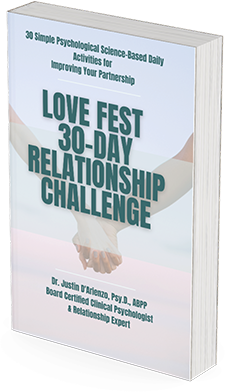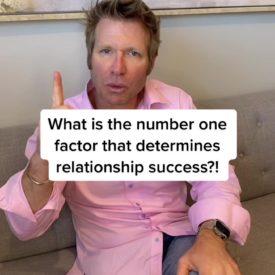- HOME
- PSYCH SERVICES
- BUSINESS & PERFORMANCE PSYCHOLOGY
- CLINICAL, COUPLES, & FAMILIES
- ADHD Treatment & Evaluation Services
- Anger Management
- Anxiety Treatment & Evaluation Services
- Borderline Personality Treatment Services
- Cognitive Behavioral Therapy (CBT) Self-Help
- Couples Counseling and Marital Therapy
- Consent for Psychological Services for Minors Post-Divorce
- Depression Treatment Services
- Infidelity Recovery
- Jacksonville Counseling and Psychology
- Military Psychology & Tricare
- Narcissistic Personality Treatment Services
- Online Counseling
- Psychoeducational Testing
- Psychological Testing and Assessment
- Psychotherapy & Counseling
- FORENSIC PSYCHOLOGY & EXPERT TESTIMONY
- LIFE COACHING & EXECUTIVE COACHING
- PSYCHOLOGICAL PUBLIC DISABILITY QUESTIONNAIRES (DBQ)
- ONLINE COURSES
- Our Partnership Begins When You Purchase an Online Course
- Get to Know Dr. D’Arienzo, Relationship Expert
- Florida Premarital Preparation Online Course
- Georgia Premarital Education Online Course
- TwogetherinTexas Premarital Online Course
- Tennessee Premarital Preparation Online Course
- Minnesota Premarital Education Course Online
- Oklahoma Premarital Counseling Online Course
- South Carolina Premarital Preparation Course
- West Virginia Premarital Education Course
- Online Marriage and Relationship Tune Up Course
- Florida DCF Certified Parent Education and Family Stabilization Online Course
- Georgia Qualified Parent Education and Family Stabilization Online Course
- Texas Qualified Parent Education and Family Stabilization Online Course
- High Conflict Co-Parenting Online Certificate Course (8 Hours)
- Online Anger Management Four Hour Course (Level 1)
- Online Anger Management Eight Hour Course (Level 2)
- Sexual Harassment Online Training
- MMPI/GUARD/LEO
- CPI Police and Public Safety Assessment
- G License Psychological Testing
- Online Psychological Testing for Armed Security Guards and Personal Protection Officers
- MMPI Texas Level III CSO and IV PPO Psychological (ONLINE)
- Requirement for Texas Security License Applicants: MMPI Evaluation
- Level 3 Security Guard New Mexico Online MMPI Psychological Evaluation
- TEAM
- SOCIAL MEDIA/BOOKS
- APPT REQUEST
Official Twogether in Texas Online Premarital Video Course
Developed by Board Certified Psychologist and Relationship Expert
Our Course is LGBTQ+ Affirmative
Dr. Justin D'Arienzo, Psy.D., ABPP, Board Certified, Clinical Psychologist

- Cost of course is $23.97
- 8 Hour Video Course
- Save $60 on Texas Marriage License
- Avoid Three Day Wait
Testimonials
 Clint
Clint"Thanks Dr. D'Arienzo. I did not know that I have both passive and aggressive tendencies. I'm fixing both because of this course. My wife said she can see a difference of taking this course."
 Amanda
Amanda"Great course!. I learned that anger was learned through my childhood and watching others, and not being able to separate the emotions that triggers anger. Now I have the answers to change my life"
 George
George"Easy to understand, got my certificate quickly for my court case. Judge approved of it."
 Christie M.
Christie M."Thank goodness a premarital course like this is offered. The exercises were practical. I used the friendship ones with my best friend too."
TwogetherinTexas Premarital Preparation Video Course Test Drive
Introduction: Welcome to the Official TwogetherinTexas Course. This course is completely online and available in a video format. You have the option of either watching the optional video or reading the material that is provided in each section, and then after reviewing each section's material, there is an exercise that needs to be completed. Before we jump into the course, let me tell you a bit about me, your course instructor. My name is Dr. Justin D'Arienzo. I am a Licensed Clinical Psychologist, Certified Florida Supreme Court Family Mediator, Parenting Coordinator, Custody Evaluator, and Relationship Expert.

I am well known for my knowledge about relationships and frequently referred to as the Relationship Doctor of Jacksonville, Florida. I spend a great deal of my clinical work conducting premarital therapy, marital therapy, and family therapy. I also have a great deal of experience working with the negative aspects that can come with relationships like divorce therapy, high conflict co-parenting therapy, and custody evaluations for the children. Overall, I have experience with the excitement of early relationships, struggles in the middle, and the demolition that follows the divorce process due to infidelity, addiction, neglect, and abuse. In addition to my clinical knowledge, tending to all kinds of relationships provides me a keen understanding of what a healthy relationship entails from the start and which relationships can survive the test of time. In addition to my online premarital course for the state of Texas, I also offer an online premarital course for several other states, including Florida, Georgia, Tennessee, and Oklahoma.
In each of my online premarital courses, face-to-face premarital and marital therapy alike, I teach a variety of material offered in this online workbook. In my experience, when this material is applied, the couple grows closer, communication skills improve, and couples discover new things about themselves and each other. Scientific studies have also been conducted showing that taking a premarital course improves the chances of having a successful marriage.
Marriage can pose many obstacles, and to persist, couples need to ensure that they have the essential skills to make their marriage work successfully. Marriage requires two individuals that are eager to provide each other (and their children) 100 percent effort amid both the challenging and the easier times. Marriage takes a lot of commitment, trust, and hard work. The completion of this online course together is an act of love and should be seen as such due to the time commitment it will take to complete it.
Let's talk again about this course. There are two options for completing this online workbook. You can complete it alone to learn more about yourself and your relationship, or it can be completed as a joint effort between yourself and your partner. Again, if you choose to complete this workbook alone, use it as an opportunity to reflect on past relationships to ensure that you have a healthy outlook on the components of your future relationship. Let's get started with section one after we review the Texas course outline.
Sections of Online Texas Premarital Preparation Course (TwogetherinTexas)
Section 1: Structure of a Healthy Relationship (Deepening Love, Friendship, and Intimacy)
Section 2: Emotional Needs for a Healthy and Happy Relationship Affair Proof Relationship
Section 3: Personality Test. How Do Your Personalities Work Together?
Section 4: Money and Marriage
Section 5: Effective Communication and Conflict Resolution for Couples
Section 6: Quiz and Questionnaire to Receive Certificate
TwogetherinTexas Section 1: Structure of a Healthy Relationship (Deepening Love and Intimacy)
A Healthy Relationship Defined
"The Sound Relationship House" – Developed by John Gottman and Julie Schwartz Gottman
The ultimate goal in a marriage is building a sound relationship house. You might be asking yourself, "What exactly is a relationship house?" A sound relationship house is not something perfect, but something that should be practical. Your sound house is likely to have its ups and downs, but it functions effectively, provides security, and is a place where family or the couple can flourish. There are four main components associated with the Sound Relationship house. These components include:
- Friendship
- Positive outlook
- Conflict management skills
- Support for each other’s hopes and dreams

Friendship
Friendship is indicative of how much we know about our partner. The Gottman's described the nature of how well we know our partner as a love map. The Gottmans explained that each of us is equipped with a love map. To truly know our partner is to know their love map. When you know your partner well, you are aware of their likes and dislikes, history (including past traumas), goals, and you are knowledgeable about their reactions to specific situations. Knowing your partner also includes knowing about their hobbies and interests like their favorite movies, television shows, and favorite foods. In addition to the knowledge we gain from just knowing our partner, many other tools can be used to grasp more of an understanding of our partner. Tools like personality tests (i.e., Myers-Briggs), which explain a lot about us and your partner and their perception of the world around them.
You might be wondering, "How can I build a love map with my partner?" The first step to building your love map is understanding your partner in ways previously described. Challenge yourself, do you have a keen interest in your partner and express your affection toward them? Do you turn in their direction when speaking? When you spend time with your partner, do you express an interest in your partner's perspective, or do you simply listen to them? Do you consider your partner to be your best friend? Do you know what they value? When you get to a point of answering yes to all of these questions, you are on the right track to building a very successful love map!

A Positive Lens
Just like a positive attitude can improve one's life experiences in general, research has found that those with an optimistic outlook towards their partner created a significant difference in their attitude toward their relationship compared to those with a pessimistic outlook in their relationship. By obtaining an optimistic outlook on life, partners can give their partner the benefit of the doubt in certain situations when their partner falls short. Likewise, when their partner does something pleasant, the partner on the receiving end sees this gesture as a confirmation that their partner is a great person. On the other hand, couples who often experience hurt, misunderstanding, anger, disappointment, unjust accusations, frustration, and personal attacks develop a pessimistic outlook about their relationship. This pessimistic outlook leads to couples having thoughts of leaving, seeking revenge, or protecting themselves, and of course, no longer giving their partner the benefit of the doubt. This negative lens creates an abundance of problems in a relationship. With a pessimistic outlook, when one's partner acts inappropriate, one views this as a confirmation that their partner is not the one for them.

Managing Conflict
Conflict management skills are essential for emotional regulation and understanding how our partners respond to conflict. Those equipped with these tools have more functional relationships. Conflict management is related to the concept of Emotional Intelligence. The Gottman's have identified couples that manage conflict effectively do well, whereas those that are not well equipped with the skills to deal with conflict often divorce. The Gottman's identified four different behaviors that are present during a conflict that sustain conflict or lead to greater conflict down the road. These four behaviors will be discussed below and are known as the Four Horsemen.
Criticism
This is identified as the first of the four horsemen. According to John Gottman, almost every relationship has a "criticism" component; however, it is essential that couples work together to reduce the level of criticism that they give their partner. When a relationship starts to become negative and produces high levels of conflict, most feedback is perceived as negative. A lot of couples even consider constructive criticism as negative. Research suggests that for every piece of criticism given, there needs to be five positive statements to counteract the negative impact of one critical statement. It can be very difficult to turn your relationship back on a positive note if you are used to negative interactions. Being critical with your partner can put your relationship on a downward slope.
The antidote to criticism is to catch the person in the preferred behavior and then reinforce it with a positive verbal statement, like, "Thank you so much for giving me a hug today when you knew I was upset." This is vastly different from, "You never support me when I'm upset."
Defensiveness
This is described as the second of the four horsemen and can be detrimental to relationships. Defensiveness is so common in couples with relationship conflict. Defensiveness is often an instinctual reflex to something perceived as criticism. Sometimes there might not be criticism but just feedback stated. The individual that receives what they perceive as criticism and responds by harshly blaming the other for doing the same thing while simultaneously refusing to accept responsibility in the matter or makes an excuse for their behavior is labeled as defensiveness. When the original speaker experiences the defensiveness of the receiver, they start to experience feelings of invalidation, and in turn, the couple becomes more distant than they previously were.
Antidotes to defensiveness are the following: (1) Remind yourself that your relationship is about becoming a part of a team (not two people working against each other). (2) Try not to perceive your partner's words as an attack but see their words as their emotional expression. (3) Know that you are not perfect. (4) Remind yourself of your partner's positive attributes. (5) Take any amount of responsibility for your partner's feedback, even five percent, but do not apologize for something that you have not done.
Stonewalling
This is known as the third of the four horsemen. Stonewalling is defined as an avoidance behavior where one refuses to address a specific issue or cause of concern in a relationship. Stonewalling feels as if the partner attempting to communicate an issue is "talking to a brick wall". John Gottman's research findings suggest that 85 percent of men use stonewalling as a means of dealing with conflict within their relationships, yet they did not realize how detrimental it could be. Men tend to distance themselves to cope with their emotions. Detaching from the emotionality of an argument does not solve the conflict. "Parallel living" is a consequence of this emotionally detached behavior. Parallel living leads to becoming detached from the relationship, leaving it exposed and vulnerable to outside forces. Stonewalling also leads to increased conflict and significant meltdowns begin to ensue when the non-stonewaller begins to chase the stonewaller regarding an issue. Upon reaching a breaking point, the stonewaller might react with rage after being chased, so to speak, often leading to the couple engaging in a regrettable incident.
Antidotes to stonewalling are as follows: Resist any temptation to detach from your emotions. Look for the good attributes of each other. Make time for positive interactions and experiences. Acknowledge your partner when they are speaking and give a response even if it is a nod or a brief reply. It is essential to practice healthy self-care habits to avoid stonewalling. The reason for stonewalling has to do with the fact that we are anxious about handling conflict because conflict causes many of us to have feelings of anxiety, and then we move to avoid the conflict. To manage the anxiety associated with dealing with conflict, it is imperative to practice healthy self-care habits like obtaining a good night's sleep, exercising often, learn diaphragmatic breathing exercises and use them, and keeping a healthy diet. Avoidance can be okay in the context of your relationship as long as you are avoiding stonewalling.
Contempt
This is referred to as the fourth of the four horsemen. (Gottman referred to belligerence as the stronger form of contempt. Belligerence is referred to as a cousin of the four horsemen.) Gottman described "contempt" as the most destructive of the horsemen. Gottman found that the presence of contempt in a relationship predicted an 86 percent chance of divorce. "Contempt" is defined as any behavior in which you or your partner feel like they are being "put down". Examples of contempt within a relationship: Belittling your partner, treating them with scornfulness, judging your partner, rolling your eyes at them, sneering, insulting them, mocking, and cynicism. Contempt might not always appear as blatant. It can be about small things like having feelings of disgust for how they chew their food, drive, or snore at night. The following are warning signs of contempt. You have lost feelings of admiration towards your partner. It is hard for you to recognize your partner's positive attributes. You feel that your partner has personality deficiencies.
Antidotes for contempt include: Start focusing and remembering your partner's positive attributes. Use "time-out" when an argument or conversation starts to become heated. Make sure you are wary of your expressions, like your tone and facial expressions. Focus on the fact that you do not like certain behavior, not the person. The most important antidote includes gaining an appreciation for your partner's perspective on certain issues. When we can empathize with our partner, we possess a greater appreciation of their behavioral causes, subsequently gaining the ability to see that their behavior is more about them than us.

Additional Tools to Resolve Conflict
Accepting Influence: Each partner must accept the others' "influence." Often relationships consist of a top and a bottom, and the top of the relationship has the ultimate veto power. Relationships are most functional when both partners possess equal veto power in the context of most issues. Dr. Gottman's findings indicate that in the happiest marriages, men accepted the "influence" of their partners. Examples of "influence" are as follows: The idea that you can learn something from your partner rather than rejecting their opinions and believing that they can also come up with good solutions to their problems.
Make Repairs
Partners that make the necessary repairs to their relationship have successfully functioning relationships. Functional relationships can resolve conflict during the argument. When an issue is resolved during an argument, these problems are resolved at the moment, and problems are not bubbling under the surface only to be resurfaced during the next feud. Further, it is extremely important to have the ability to express apologetic behavior towards your spouse. Being able to accept responsibility and say you are wrong takes a large amount of courage and trust in a relationship. Expressing that you are sorry towards your spouse helps reduce future conflict and creates a lasting, loving relationship.
Use Humor
Creating a peaceful atmosphere where an individual can break the negativity is very helpful. One partner might use tactics of humor or offer their partner a cup of coffee or tea, ask their partner for a hug or make light of the nature of the argument without demeaning the other person.
Sex
Make-up intimacy has a positive impact on the levels of peace and helps reconnect both of the partners. Having the feeling that your partner will accept your efforts to improve the nature of the situation is extremely important.
Compromising
The act of compromising is imperative for building trust and building commitment in a relationship. Possessing feelings that your partner will give way on things if there is a conflict ensures security within a relationship. Dichotomous thinking, also known as "black and white thinking" might possess feelings of "I am right so my partner must be wrong" which can be extremely detrimental to a relationship. A functional relationship must engage in giving and taking when in conflict and also learn to share power.
Begin with the End in Mind: Couples need to imagine an end in mind when they are engaged in conflict. So, what should the end in mind entail? The end in mind should consist of resolving the issue at hand and ensuring that you and your partner feel good after the conflict.
Work Through Stubbornness and Flooding: The couple must find effective ways to control their feelings of stubbornness. There is no way possible that you are always right 100% of the time. Learn relaxation methods, which means they should be cautious about their heart rates. When your heart rate increases to 90-95 beats per minute, then you are feeling emotionally flooded and you need to take a step back before you engage in conflict resolution with your partner. When you are emotionally flooded, you are not able to engage in rational thinking and are constantly in a state of fight, flight, or freeze. When we are feeling emotionally flooded, it is essential to pause and take a time-out for about 20 to 30 minutes from a disagreement and then revisit the conflict later to solve the conflict. Just like we should not hit our children when we are feeling frustrated, we also should not discuss topics of disagreement when we are emotionally flooded. If flooded, it is likely that we will say or do things that we will ultimately regret.
If you start to feel emotionally disturbed during a conflict with your partner, you must step aside from the argument, take a break from the argument, however, you must continue resolving the conflict upon returning from your break. The following are some warning signs of flooding – starting to feel overwhelmed, not being able to keep calm, longing for distance, or small issues are developing into big issues. It is extremely important to take a break if you are flooding.
Markman and Stanley Techniques: I have demonstrated some appropriate talking techniques that have been adapted from Markman and Stanley in "Fighting for your Marriage." The techniques that I have illustrated ensure that each partner gets to speak and feel heard without being interrupted by the other partner.
Use an object that both of you value such as a talking tool (for example, a wedding ring, or a family valued photo). One at a time, each person gets to take a turn to hold the item. The person holding the item gets to hold the floor. The listener then repeats what they heard and confirms that it is correct. The other person then takes ahold of the speaking object and talks while their partner summarizes.
John Gottman's Technique: Dr. Gottman has illustrated a five-step tool that enables a couple to communicate an issue or area of concern that needs to be addressed. The ultimate goal is not always to be right. The goal is to gain a deeper understanding of where your partner is coming from in an argument. When working couples, I try to ensure that both of them feel like they have been heard, understood, and accepted for their feelings. When both of the individuals feel like they have been heard, understood, and accepted, the emotionality of the situation diminishes, and the couple can more easily come to a resolution. The secret to couples that get along easily is that they tend to agree to disagree with one another. In smoothly working couples, disagreements don't threaten a couple's stability or safety.
Using the five steps below, couples need to work through these steps with one another.
- Feelings: Share your thoughts and feelings about the situation. Do not explain why you had those feelings. Do not comment on the way your partner feels. Make sure that you stay in your lane.
- Realities: Elaborate on your "reality." Make sure to take turns. Summarize and support at least some of your spouse's reality. You should not be intimidated by your spouse's feelings. There is a tendency to engage in selective attention during conflict and spouses tend to have different memories of the same event.
- Triggers: Share the experiences or memories that you have had that may have exacerbated the conflict, and why these are considered triggers for each of you. Own your trigger. Do not blame, criticize, or dismiss the triggers of your spouse.
- Responsibility: Recognize your role in the conflict. Accepting responsibility for your actions is the opposite of defensiveness. This deescalates our relationship when we take accountability for our actions.
- Constructive Plans: Plan a way together to make it better for each of you next time. Now that both of you have a better understanding of where your partner is coming from, you have been heard, and that each of you has accepted responsibility for the unfortunate conflict, you are better equipped to come to a resolution with your partner.

Shared Meaning
Being supportive of one another's goals and aspirations and having a shared understanding of the meaning ties us into the last section of the Sound Relationship House. When we have gained the ability to achieve friendship with our partner, see our partner more optimistically, and utilize our conflict resolution skills, then we are ready to partake in the last component. This piece entails having shared rituals, goals, roles, and symbols with one another.
Rituals
The act of defining shared rituals is imperative. Rituals tend to bond couples together, provide a sense of security, and give each of us an activity that we can look forward to. Start to ask yourself what kind of rituals you would enjoy creating with your partner. What current rituals do you engage in with your family members? Do you already eat dinner with one another, or do you engage in special celebrations that you value, and do you share the same values about television, education, or time spent with each other?
Individual and Joint Goals
Just as it is essential to have created customs, fruitful couples have shared objectives and dreams for their lives and the relationship and individual ones. Again, a successful relationship is one that supports every individual accomplishing their very own objectives just as the objectives of their partner. Ask yourself and your partner, do you respect each other's objectives, do you have comparative monetary objectives, do you have good life dreams, do you each esteem the achievements of the other, and do your life ways fit well together?
Roles
Within an effective and well-functioning relationship, each spouse has agreed on specific roles and responsibilities that are accepted by the other spouse. Challenge yourself, am I doing everything I can to support my partner's role in the family, do one of us have an expectation for the other partner that is not shared? How do our views on our relationship roles affect our relationship?
Symbols
In an effective relationship, each spouse tends to understand their partner's meaning behind their symbols related to daily life. It is not important to have the same understanding; however, couples must learn to appreciate what the following symbols mean to their partner. It is also imperative that couples not only appreciate but honor their partner's reality of these symbols.
Some key symbols include:
- The home
- Money
- The meaning of family
- The role of sex
- Fun and play
- Trust
- Personal freedom
- Autonomy
- Sharing power
- Adventure

SECTION 1 EXERCISE
Spend 30 minutes as a couple and complete the following exercises.
- Share something with your partner that they don't know about you.
- Each of you shares something that you admire or find amazing about the other.
- Commit to each other that for today you will practice moving toward each other and be open to the other's expressions of affection and desire to communicate.
- Explore together how the balance of power may be improved in the relationship. Do you both share equal power related to spending, children, plans, and domestic responsibilities?
- Use one of the techniques above to discuss an issue that has created conflict (Gottman or Markman and Stanley).
- Together discuss a personal goal that you would like the other to help you accomplish, create a new ritual that will define you as a couple, and discuss personal values that you each have that you would like to follow as a couple.

Free Bonus - Dr. D'Arienzo's ebook

Get Dr. D'Arienzo's Love Fest 30-Day Relationship Challenge: 30 Simple Psychological Science Based Activities for Improving Your Partnership. This e-book is valued at $4.99 and is included FREE with your course purchase. As seen on Amazon, this e-book welcomes you to Dr. D'Arienzo's Love Fest 30-Day Relationship Challenge! Get ready to embark on a transformative journey that will strengthen your bond and bring you closer as a couple.
From the author of:
Over the next 30 days, he will provide you with daily activities rooted in psychological science to improve your relationship. By participating in this challenge and being bold in your commitment, you will witness positive changes and experience the joy of deepening your connection. Each day, a new activity will be presented. Get ready to take your relationship to new heights and create lasting memories together. Let the Love Fest begin!
How It Works
- Click on the Click Here to Purchase button above and below to make your secure payment (Paypal or credit card) 24-7, or you may also contact our office directly at (904) 574-4917 to make a payment during regular business hours (9-5) Monday through Friday. Both options are secure and quick methods to get started. Please note that payment for any of our online courses are non-refundable unless you accidentally purchase more than one.
- Once payment has been received for the course, you will receive an automatic email with the password and the login page, or you can use the password sent to you and click here: Login to the Texas Premarital Education Program Course Here or click on our site's homepage at https://www.drdarienzo.com and find the courses tab. If you are having trouble finding your password or accessing the course, please contact our office during our normal business hours of Monday through Friday from 9:00 a.m. to 5:00 p.m. EST (904-574-4917). We can also be emailed at [email protected].
- After logging in with the password, you will have 180 days to complete the course. Texas law requires that you spend a minimum of eight (8) hours on the Texas premarital course. The Texas premarital counseling course, TwogetherinTexas, is structured to be completed with the included exercises, which takes 8 hours to be completed as instructed. You will not receive your certificate until you spend eight hours completing our course. Once you have finished reading through the material and completing the exercises, you will need to take the quiz which is at the end of the course. Please take your time and fill out the information accurately. After the quiz has been submitted, we will be notified, and we will register your completion with the State of Texas at the State's TwogetherinTexas website. We will then send you an official TwogetherinTexas Premarital Course Certificate via email within one business day to the email address you provide on the quiz.
Brief Course Description Video

8 Hour Online Video Course
More Details about our Twogether in Texas Premarital Education Program
Twogether in Texas is a program in Texas with which Dr. D'Arienzo has partnered. This Texas premarital course is dedicated to improving the well-being of children by ensuring that their current or future parents learn the necessary educational skills to parent. Our program is completely voluntary and is completely online as well. Here Texas residents can find information about Texas premarital couples accessing marital, pre-marital, and relationship enhancement classes. Fortunately, all Texans are able to access these services online from D'Arienzo Psychological Group. There are zero eligibility requirements. Texas couples that complete 8 hours of pre-marital education through Dr. D'Arienzo's online Texas premarital course are able to receive $60 off their marriage license state fee. Additionally, by taking our Texas premarital counseling course, you avoid the three day wait, meaning you can get married the same day that you complete your marriage application.
Out of the 288,000 happy Texans who have taken similar premarital classes, 95% of Texas couples say they have learned skills to:
- Improve their relationship.
- Increase their ability to communicate and share feelings.
- Understand and feel understood by their spouse.
- Disagree without fighting.
- Enhance relationships with children.
Benefits of taking our online Texas premarital education course include:
- Enhancing your communication and conflict resolution skills to enrich your relationship,
- Learning the key components of a successful marriage,
- Receiving a $60 discount on marriage license fees, and
- Waiver of the 3-day waiting period.
Once you successfully complete the premarital education class, Dr. D'Arienzo and his office will issue you a certificate via email within one business day to present to your County Clerk to receive a $60 discount when you purchase your marriage license.
Google Reviews
Premarital Course Reviews
Submit your review | |
TwogetherinTexas Premarital Course
Average rating: 73 reviews
Manuel Quiroz
Jun 24, 2025
TogetherinTexas Premarital Course
The course was thought provoking and learned some good tips for a happy marriage.
Vern Alg
Mar 28, 2025
Really good course.
Just what every couple needs to get off to a good start in a marriage.
Astralia Espinoza
Mar 11, 2025
Amazing course...
My fiance and I, we both found this course to be helpful and informative. It definitely breaks down all you need to know before taking the next step in your relationship.
We highly recommend this course!!!
5923993295
Feb 8, 2025
premarital class
This was a very educational class that brought my husband and i new insight on ways to look at things in a different setting. i would highly recommend this class to anyone before getting married.
J. Stewart
Feb 5, 2025
Great Course - Highly Recommend
The online course was convenient, detailed and very helpful on our journey to the altar. We appreciated having the flexibility to complete this when our schedule permitted.
Highly recommend.
Grace
Jan 26, 2025
Awesome Course
Very detailed and informative for people beginning a new journey into their next level of life! Highly recommend
Thank you Grace for the positive feedback about our Texas Premarital Course! Best, Dr. D
Elyjah Jackson
Jan 6, 2025
This was a Fun Course
My Spouse and I enjoyed completing this course. We learned a lot, and laughed a lot. Many convicting statements were read...
Eric Garcia
Oct 6, 2024
Very detailed course. My fiancé, and I loved it especially the couples exercises! we learned quite a bit about each other, and ways to make our marriage great!!
V. Silvestre
Aug 27, 2024
Just Awesome!
We learned so much in this much needed course! It is full of facts and we loved the option to go at our own pace and to watch videos as well as read it in written form! It left so much room for learning!
Mariya Gipson
Aug 27, 2024
Premarital class
Great material for couples needing premarital help
Page 1 of 8:
«
‹
1
2
3
›
»
Articles About Taking the Course
Texas Premarital Course Information
Official Twogetherintexas Premarital Course
Official TwogetherinTexas Premarital Course Do you want to save $60 on your Texas marriage license, avoid the thr...
View more5 Tips for Effective Communication
5 Tips for Effective Communication Communication is one of the most important skills in any field. Whether you're a stu...
View moreBenefits of Taking an Online Premarital Preparation Course
Benefits of Taking an Online Premarital Preparation Course Getting married is a big decision, and it's important to be ...
View moreCertified Texas Premarital Preparation Course
Texas Sized Savings on Texas Marriage License Avoid the Three Day Wait Official Texas Premarital Site for In...
View more




























 Clint
Clint Amanda
Amanda George
George Christie M.
Christie M.





